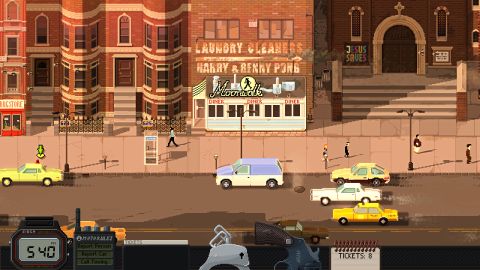Our Verdict
Half enjoyable adventure, half clunky mess, Beat Cop is a talented rookie in need of a long talk with HR.
PC Gamer's got your back
What is it? Sidescrolling adventure starring an NYPD neighborhood cop
Reviewed on: Windows 10, i5 4690k, 8GB RAM, Nvidia GTX 970
Price: $15/£12
Release date: Out now
Publisher: 11 bit studios
Developer: Pixel Crow
Link: Official site
Buy it: Humble Store
Read our affiliates policy
I've written 15 parking tickets—and if I want a bonus, I'll write a few more. I've helped the owner of a sex toy store get rid of a body. The Italian crime family wants me to make some evidence disappear, and the local gang is furious because I arrested two of their drug dealers. Today has been so crazy that I haven't had time to grab a donut. When a car theft call comes over the radio at the other end of the block, I'm so exhausted and hungry that I just can't run there in time.
As a point-and-click adventure game depicting the day-to-day grind of an NYPD street cop in 1980, Beat Cop is pretty good, a little pressure cooker full of stress and tough choices. It's stocked with engaging, likeable characters, and I was surprised when I started to feel proprietorial over my beat and the people in it. As a drama centered around a larger mystery, though, Beat Cop struggles with structural and writing problems that make late story beats land with a thud.
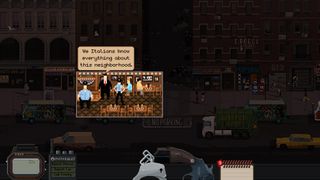
Bring the noise
From the day Kelly’s new beat starts, he's got 21 days to clear his name before the senator takes him to court.
Beat Cop draws unapologetic inspiration from schlocky '80s cop dramas: the main character, Kelly, was a hard-charging, trigger-happy detective, but he got busted down to patrol duty after a highly politicized shootout at a senator's mansion. While he clears his name and tries to make detective, he's writing parking tickets and stressing out about alimony payments.
The setting and pixel-arty graphics are lovely and grim, but Beat Cop’s stupid approach to racist and misogynist dialog lacks any particular message, with characters spewing slurs aimlessly as though celebrating simpler times. Decades ago, cops could probably get away with calling black people “darkies” and Asian people “slant-eyes,” but even in 1980 the targets of those words didn’t join in on the laughs. As a whole, the general impression is like watching Blazing Saddles if it had been written by someone who didn’t have any kind of social commentary in mind. It offends everyone equally, but not everyone is in on the joke.
I found the game’s mystery and action compelling enough that the tone-deaf dialog wasn’t a game-ruiner; merely an annoying off-note. From the day Kelly’s new beat starts, he's got 21 days to clear his name before the senator takes him to court. Each day serves as a self-contained chapter, and they all begin at the precinct station. Kelly and his officers get berated by the sergeant and given their marching orders. Daily objectives focus on ticket quotas: write ten parking tickets, tow five cars, cite four drivers for broken taillights. Kelly hits the street to meet his quota and keep the peace in his corner of New York.
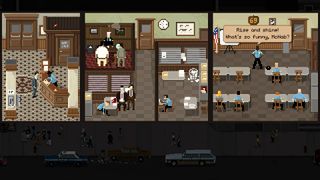
It’s a precarious balancing act that made me feel successful only when everyone was mad at me.
Kelly’s beat is a side-scrolling adventure game level one block wide. Kelly walks where the mouse clicks, spending eight-hour shifts talking to citizens, arresting criminals, and writing tickets. Between his official duties, he fields phone calls and investigates his own case on the side. While a lot of the moment-to-moment action involves such high-stakes drama as writing the badge number on parking tickets, the pressure of these daily objectives does a great job of ramping up stress and adding structure to the days.
The way Beat Cop creates a dozen competing priorities and points them all straight at Kelly is the key to making mundane work like parking patrol challenging. Kelly has to make arrests and write tickets, or he’ll get fired. Arresting the Italians or the neighborhood gang makes them angry; if they get too angry, they’ll kill Kelly. Regular alimony payments put Kelly under financial pressure, so accepting the occasional bribe is a necessity. Stopping to eat during the day costs time and money, but without occasional breaks Kelly is too exhausted to chase and tackle criminals. It’s a precarious balancing act that made me feel successful only when everyone was mad at me. As the clock ticked down each shift, juggling all these important jobs created a relentless, frantic pressure that I found myself enjoying.
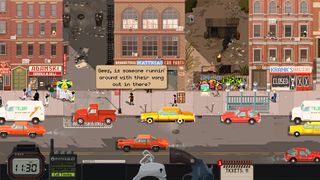
The greater good
Even though each day presents its own challenge—like the time I had to chase a doomsday cult out of the local church or the day I had to help a retired pornstar shoot one last film—the bones of the game is Kelly’s experience with clearing his name and solving the mystery of the shooting at the senator’s house. Even though this mystery is well-written and intriguing for the most part, Beat Cop makes some weird design choices that really bummed out the fun I’d been having.
For all the control I have over the ability to falsify tickets and take bribes, I have absolutely no control when it comes to the overarching storyline. All of the main story beats happen inside of scripted dialog exchanges, and the sudden loss of self-determination was really jarring.
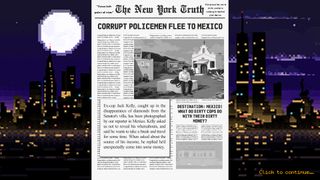
Beat Cop feels like two distinct and ill-fitting halves of the same cop drama idea.
Weirdly, one recurring shady character comes by every few days to offer an escape: for $2,000 he’ll set me up with a new ID and a new life in Mexico. I took enough bribes and ran enough drugs for the mob to afford the ticket halfway through the game, so I was pretty shocked when this option simply ended the game. I reverted my save to before I paid for the ticket, wondering why on Earth a game would give me an option to Game Over myself halfway through a mystery.
There’s also one truly terrible puzzle late in the game, on Day 18. One bad puzzle wouldn’t rate a mention, but it’s apparently an essential part of the main storyline, so I’m shocked that it was released in this state. The riddle itself is a word-salad quiz involving prime numbers, and even with Wolfram Alpha’s help on the calculations I couldn’t tell what I was supposed to be doing. I didn’t solve it before time ran out but nothing bad happened, so I was shocked to hit a Game Over screen three hours later. Even once I finally looked up the answer to the Day 18 puzzle, I can’t see how I was supposed to figure it out from the provided clues. In order to see the conclusion of the mystery, I had to play the last few days again—and frankly the conclusion was barely worth the trouble.
Beat Cop feels like two distinct and ill-fitting halves of the same cop drama idea. If it were a relatively tone-deaf, endless sandbox adventure where I maintained my beat, wrote my tickets, and solved some crimes, I would have enjoyed it a lot more than I did. The larger corruption-centered story arc wasn’t handled well, and it brought a lot of poor design choices into an otherwise interesting twist on the side scrolling adventure game.
Half enjoyable adventure, half clunky mess, Beat Cop is a talented rookie in need of a long talk with HR.
